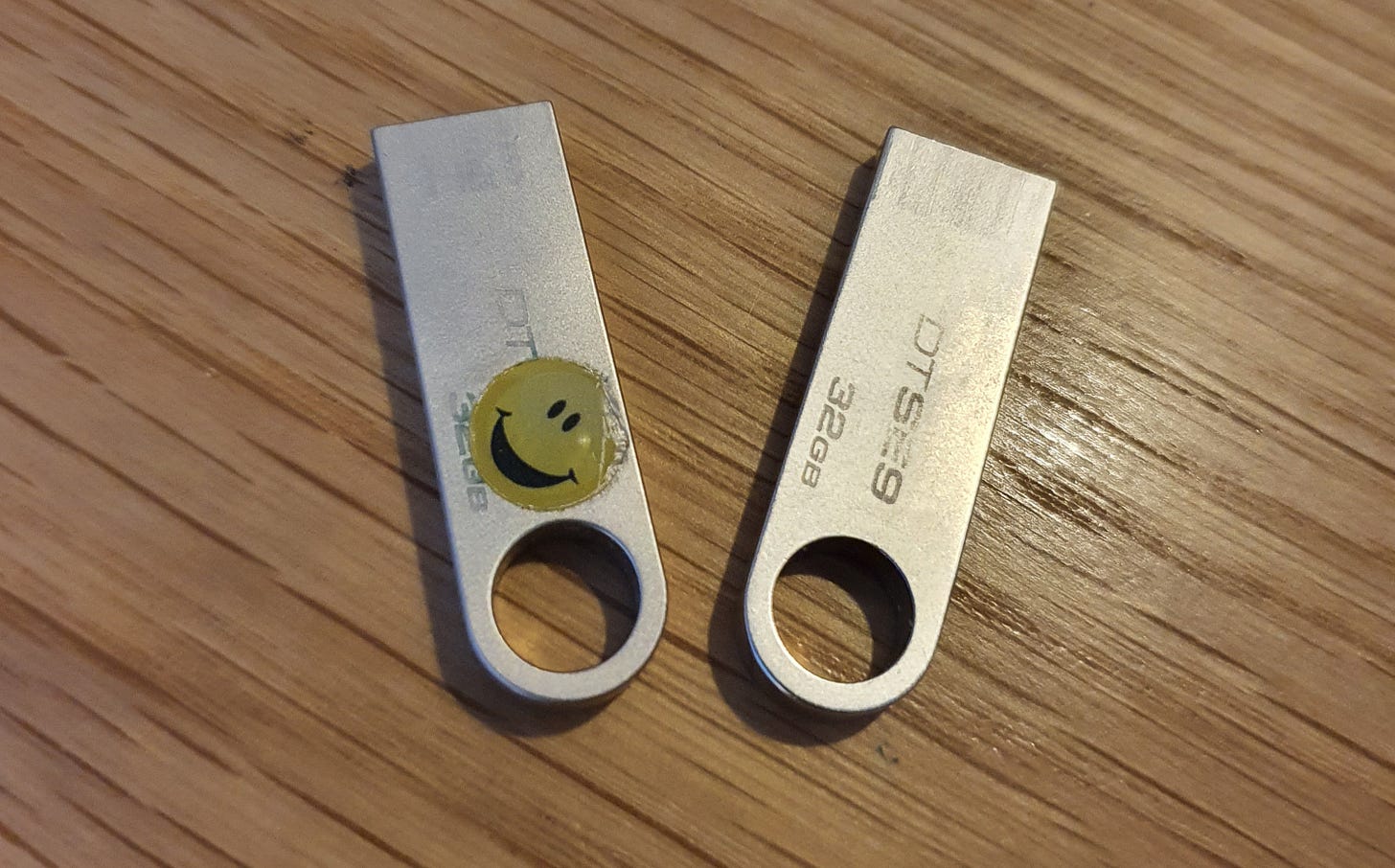I can't bring myself to abandon my memory sticks. In the shifts of technological change, the memory stick has stuck. They seem to have become too deeply embedded in my writing practice to be easily jettisoned. When it comes to storing my words I’m trapped in that technological moment when the pull of the new is outweighed by the force of habit.
I know these devices are old fashioned and I also know that I really should move on, but shifting everything into the cloud is an uncomfortable step to make lightly. It's partly to do with the stubbornness of well-worn routinised practice. At the same time, it's also about the materiality of research and writing. Everything I write I routinely backup twice, once on each of the two identical memory sticks. It's a matter of both trust and habit. The two backups feel like a sturdy safety net.
A few months ago the lack of a USB socket on my new laptop brought a disruption. A familiar practice was suddenly rendered visible. This disruption to my routine forced some reflection. It brought with it a realisation that what was once a technological advancement is now some way behind the times.
Part of the story here is that I was socialised into a kind of materiality. A digital materiality - of CDs, floppy disks, DVDs and the like - but a materiality nonetheless. Even the digital had its objects. It now seems hard to let go of the tangible. Despite this reluctance, moving to streaming and the like means that some of these objects have already fallen away, but the memory stick remains. This got me thinking about why it has endured for so long. It occurred to me that the memory stick means that, notionally at least, I know where my writing is. The thing I'm writing is in my draw. It has a location.
Casting my mind back, the memory stick became part of my writing just as I was moving toward the completion of my PhD (around 2005 or 2006). It was a time when my writing routines were solidifying a little. Before that I was using floppy disks, which had limited space, and writable CD roms, which were awkward and slow. The memory stick was a bit of a revelation at the time. That step was easy to make because it made things very much easier and also because my approach to writing hadn’t stabilised, and so was less fixed. It represented a new method of storage that made sense and that retained the materiality I was used to. I’m not sure I’ve changed very much since then.
Many will have managed this transition away from a previous type of materiality far better than I have. At the same time, perhaps others are also holding on to some material practice or device despite the march of remediation. I also still have a paper diary, even though it is partly replicated in an online version. Seeing tasks laid out on a page and having a diary that I can hold and mark tasks into is another thing that feels hard to let go of.
Perhaps this is also about the little quirks and routines that we build up in our practices. Plus, technological developments can move at a disorientating pace, so sticking rather than constantly twisting could make sense. Coping with the flows of technological change might involve occasionally stemming the tide (holding on to a phone for several years without upgrading, keeping an old laptop despite the wear and tear, listening to CDs, those sorts of things). There is something comforting and reassuring about a technology that we know well.
As I was writing this I happened to watch an interview with the music producer Steve Albini. He was talking about why he always uses analogue equipment to record music. His answer was a bit of a surprise. It wasn’t just to do with the sound, it also meant that he was always sure that he could retrieve and use the recordings at any point in the future. He mentioned that sometimes recordings were revisited later, during key anniversaries or because they have subsequently become classic albums, and he wanted to be sure that he could use anything that had been recorded at the sessions. His issue was that changes in equipment and the multiplication of formats meant that the same accessibility could not be assured for digital recordings, some of which would be lost because there was no device available anywhere to play the format back on. The fickleness of digital technology was his concern. At first I thought that my use of memory sticks was a bit like Albini’s sticking with a format, but then as I thought about the lack of a USB on my new laptop I realised that actually I’m seeing a creeping version of the problem Albini was identifying. Digital fickleness1.
As for the new laptop, I found a USB adapter. So my writing is still in my desk draw, for now.




